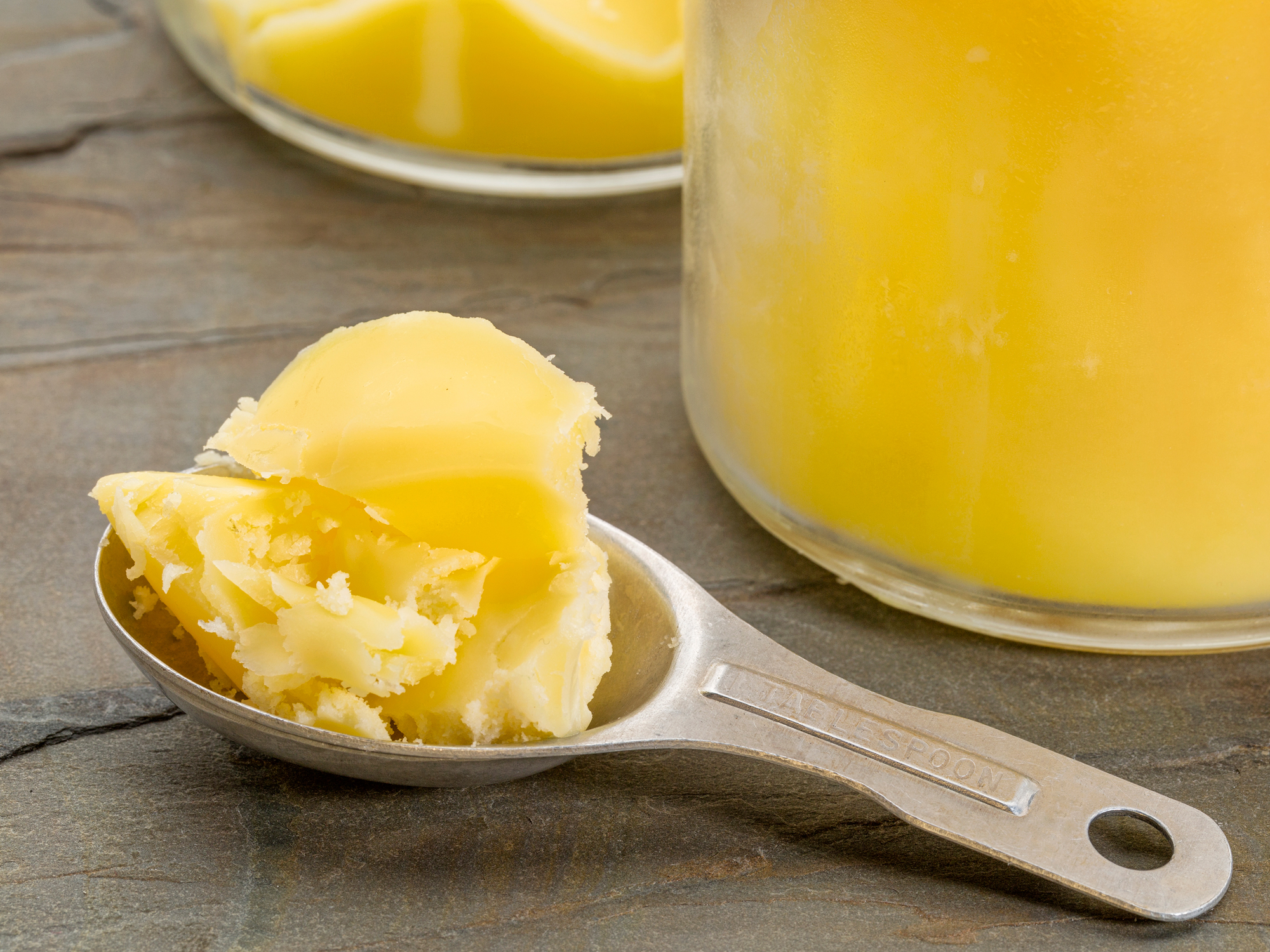Get Easy Health Digest™ in your inbox and don’t miss a thing when you subscribe today. Plus, get the free bonus report, Mother Nature’s Tips, Tricks and Remedies for Cholesterol, Blood Pressure & Blood Sugar as my way of saying welcome to the community!
5 Reasons to eat butter’s better cousin (not margarine!)

Sick of hearing your doctor say, “Don’t eat this…”? Tired of all of the good stuff being off limits and bad for you according to the so-called experts and being forced to give up the foods you love most?
Well, here’s some good news for you…
There is a type of butter that is so good for you that it gives you a special license to ignore all those warnings about high fat foods.
It’s called ghee, and unless you’re a big fan of Indian cooking, you may never have heard of it before. Ghee is basically clarified butter, made by heating up the butter to separate the fat from the remaining moisture and milk fats.
Why you should eat ghee
- Dairy intolerance? No problem!
Even people who are lactose-intolerant or have a problem with casein, a protein found in other dairy products, can usually eat ghee without worry. This is because the process of making ghee actually breaks down and removes casein protein.
- No long-chain fatty acids
Ghee is made up of short and medium chain fatty acids, rather than the long-chain type found in other types of butter and oil. Since these short and medium chain fatty acids do not contribute to heart disease, it makes ghee a great choice.
- Lots of Vitamin A
Just one tablespoon of ghee can provide approximately 15 per cent of your daily requirements of vitamin A, which is vital for bone growth, a strong immune system and healthy vision.
- Gets rid of inflammation
Ghee is also a rich source of butyrate, which helps decrease inflammation in your body, improves your digestive system, and may even help prevent colorectal cancer. Diets high in this short-chain fatty acid have also been shown to improve brain health, decreasing the symptoms of many neurological disorders.
- Full of cancer-fighting CLAs
Ghee made from grass-fed butter has a high level of conjugated linoleic acids (CLAs). CLAs are so powerful they’ve been used to improve symptoms of patients with asthma, immune system disorders, body composition issues and high cholesterol. One study even showed that as little as 0.5 percent CLA in your diet could reduce tumors by over 50 percent in breast, colorectal, lung, skin, and stomach cancers.
How to add ghee to your diet
With all these amazing benefits, it’s easy to see why ghee should be a staple in your daily diet. You can either buy ghee in the store, which can be expensive, or you can make it at home. If you choose to make your own, here is a quick and easy recipe:
- Using a medium saucepan, heat butter on medium heat.
- Allow butter to melt and bring to a boil, stirring constantly. You will notice that the oil will separate itself. The top will begin to froth; remove froth.
- Allow the oil to become clear. Once clear, remove from heat and allow to cool for 15 minutes.
- After cooling, strain ghee through a very fine strainer into container or jar, or through 3-5 layers of cheesecloth.
- Place a lid on container and store on a shelf to last up to a month, longer in the refrigerator.
Anything that you would normally use butter or oil for — you can use ghee. Make it your primary cooking fat for sautéing or swap it for butter and spread on baked goods. Toss steamed vegetables with ghee and sea salt for the best flavor. If you’re roasting vegetables, just drizzle it over the top before baking. You can also use it in any recipe that calls for cooking oil, coconut or palm oil.
Ghee is a golden source of so many benefits that it’s time to kick those outdated low-fat recommendations to the curb and start taking advantage of this miracle of nature to supercharge your health.
Sources:
-
http://www.huffingtonpost.ca/2014/09/25/ghee-benefits_n_5883174.html
-
http://www.webmd.com/a-to-z-guides/supplement-guide-vitamin-a#1
-
https://www.ncbi.nlm.nih.gov/pmc/articles/PMC3070119/
-
http://www.sciencedirect.com/science/article/pii/S0304394016300775
-
Lee KW1, Lee HJ, Cho HY, Kim YJ. Crit Rev Food Sci Nutr. 2005;45(2):135-44.
-
https://www.ncbi.nlm.nih.gov/pmc/articles/PMC4964663/
-
http://jn.nutrition.org/content/137/12/2599.full
-
https://www.thespruce.com/ghee-clarified-butter-2355472












